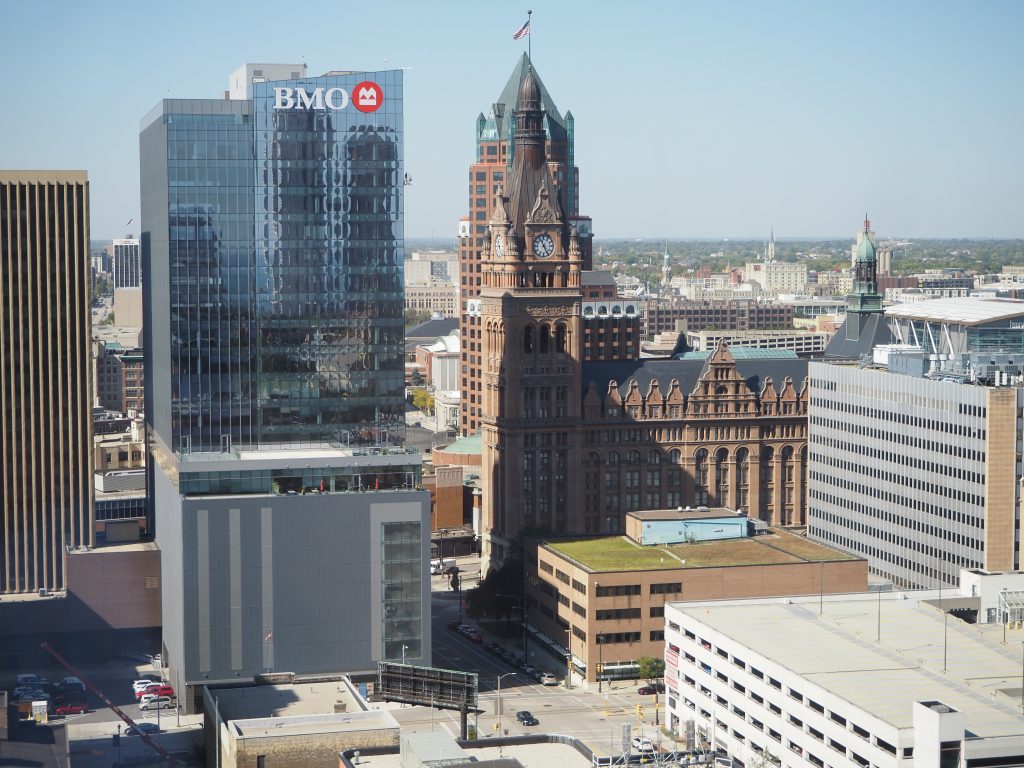Council Debates 53 Budget Amendments, Adds Spending, Services
Full-day meeting adds services, but includes lots of discussion on what is or isn't appropriate.
Residents of the city of Milwaukee would see expanded library hours, more repaved streets and repaired sidewalks, a new lead abatement program, more trees planted, additional traffic calming infrastructure and more early voting sites through a series of 2024 budget amendments recommended Thursday by the Common Council’s Finance & Personnel Committee.
Bolstered by a new sales tax that starts Jan. 1, the city’s annual budget deliberation has looked radically different this year.
Mayor Cavalier Johnson proposed a $1.91 billion budget that proposed no notable cuts, an expansion of police and fire services and a surge of infrastructure cash financing to address several backlogs . The council, instead of debating what it needed to cut, has spent its time debating what it could prioritize restoring or expanding.
But that doesn’t mean the process has been easy. During its budget amendment meeting Thursday, the Finance & Personnel Committee spent more than seven hours reviewing 53 amendments. The meeting followed a month of hours-long department budget presentations.
The full council will vote on the budget on Friday, Nov. 3, sending it to the mayor for possible line item vetoes.
Much of Thursday’s deliberation focused less on policy items, and more on confusion or disagreements on funding sources and procedural processes, including the need to undo a vote.
One of the key sources of debate is the fact that the budget is effectively the last chance to allocate the the remainder of the city’s $394.2 million American Rescue Plan Act (ARPA) grant. A number of the amendments attempted to reallocate portions of the funding to advance new issues. But ARPA director Andrea Fowler and budget director Nik Kovac repeatedly warned that doing so could jeopardize the grant funding because of looming deadlines and contracting difficulties. Most of the remaining ARPA grant is going towards plugging budget shortfalls, and as a result the city’s financial pressures are expected to return in 2025, though at a smaller scale then before the state revenue package was passed this summer.
A key driver of confusion early in the meeting was caused by a political choice made in the crafting of the omnibus amendment, which contains almost all of the new spending. Lead sponsors, Marina Dimitrijevic and Council President José G. Pérez, describe their proposal as a $6.6 million amendment that adds to $2 million to the mayor’s proposed $5 million Citizen-Led Transformational Fund. But the amendment immediately spends $4.6 million from the fund on citywide initiatives, leaving the fund with $2.4 million. Spending of the transformation fund would be guided similar to how the ARPA Task Force was to allocate the remaining ARPA funds, but the drastic reduction in the tens of millions the task force once thought it might have isn’t sitting well with task force chair Alderwoman Milele A. Coggs nor member Ald. Mark Chambers, Jr.
Coggs attempted to divide the omnibus amendment to vote only for the $2 million addition to the transformation fund, but not its expenditure. But because the actual accounting portion of the amendment simply shows a reduction she could not. The committee voted before affirming that was the case, leading to a lengthy discussion with City Clerk Jim Owczarski, the council parliamentarian, explaining what actually could and couldn’t be voted on and budget director Kovac explaining that his office views the amendment as a $4.6 million proposal, not $6.6 million
“This clearly states ‘$2 million put in there,'” said Coggs, citing the narrative. “What I’m hearing from sponsors and from you clerk is that isn’t really true… I feel like I’m speaking Chinese.”
“I feel like we’ve been clear about that,” said Dimitrijevic, the finance committee chair.
“If I can’t divide it like that, it shouldn’t be written like that,” said Coggs. “I am seriously concerned with how that was written.”
Coggs and Chambers voted against the omnibus amendment. Ald. Michael Murphy voted for it, but said he has concerns about portions of the policy. An amendment from Murphy was held because of a drafting error, but the alderman said he will reintroduce it at the full council meeting.
The amendment is sponsored Dimitrijevic, Pérez, JoCasta Zamarripa, Robert Bauman, Jonathan Brostoff, Russell W. Stamper, II, Lamont Westmoreland and Scott Spiker. For a detailed look at what it contains, see our coverage from last week.
While Coggs was unsuccessful in defending the task force’s remaining funding, she was incredibly successful in introducing policy footnotes. More than a dozen footnotes are included in the budget, including measures that aim to expand the Healing Spaces initiative, revamp the payment-in-lieu-of-taxes program and trigger reporting on neighborhood-level spending.
One footnote, introduced by Chambers as the last item at the meeting, would make the dockless scooter program permanent, ending a nearly annual start-stop temporary program review process.
But Spiker warned that such policy shouldn’t be crafted as a footnote, especially with the Department of Public Works (DPW) leaders gone,. “Usually footnotes tell the department to give us this kind of information, that kind of stuff,” said the alderman. “I don’t want to try to usurp [the Public Works Committee] and the chair’s role in deciding this.”
But the measure passed on a 3-2 vote, with only Spiker and Murphy in opposition. Dimitrijevic said she could flip to a no vote if DPW opposes the proposal.
Earlier in the meeting, DPW Commissioner Jerrel Kruschke said fees from the operators were now bringing in $250,000 per year which were being used on scooter and bike infrastructure like protected lanes.
Three Milwaukee Public Library branches would see Sunday hours restored under the budget for the first time since 2020. Central Library would be open from 1 p.m. to 5 p.m. every Sunday of 2024, while the Tippecanoe and Good Hope libraries would be added in July. “I can tell you with quite a bit of evidence, there is a huge amount of community support for this,” said Library Director Joan Johnson. The southside and northside locations are likely to be selected, said Johnson, because they don’t require an additional security member and are new or recently renovated facilities.
The Milwaukee Election Commission would add early voting at the UW-Milwaukee and Milwaukee Area Technical College campuses. Both were already budgeted to have early voting for the fall general election, but they would also receive weekday hours for the spring general election.
The committee’s actions, subject to full council approval, added $269,848 to the tax levy, a 0.09% increase. But the mayor’s budget already included a 2% increase. Should the changes stand, the city share (approximately one third) of an average property tax bill would increase by approximately 2.09%. A variety of factors prevent the amount from being exact, including changes in assessments and new construction.
Much of the tax levy expansion is tied to $150,000 in additional funding for the Direct Connect MKE employment connection program in the Office of Equity and Inclusion. One of several items that caused confusion and disagreement between members, Coggs had intended the funding to come from $770,000 in previously unrecognized state aid that Comptroller Aycha Sawa recently identified. But that money effectively is already spent, because the city was recently informed it will likely not receive a $750,000 payment from the Wisconsin Center District and the omnibus amendment spent the $20,000 gap.
Spiker and Murphy voted against the proposal because it would fall back on the tax levy. Kovac said the mayor recommends that the funding should come from the transformation fund instead of using the tax levy.
Several proposals failed, including a move to lower the street lighting fee in light of the new sales tax, further expansion of the Office of Equity and Inclusion, the addition of even more early voting sites for primary elections and the creation a dedicated funding source for the repair of public housing. A number of other proposals were withdrawn by the sponsors before they could be voted.
One proposal that was pulled before a vote was an ARPA reallocation from Chambers that would have freed up revenue to pay new formal uniforms for the Milwaukee Fire Department and adding funding to the transformation fund by eliminating spending on new fire and police radios. Fire Chief Aaron Lipski thanked the alderman for his support and said the department could use the uniforms, but distanced himself from the proposal. “This has developed into something I have little interest in being connected to,” said the chief of the funding source.
Although much remains to be sorted out, the omnibus amendment did include approximately $120,000 in funding to assign building inspectors to Housing Authority of the City of Milwaukee properties. A campaign from Common Ground Southeastern Wisconsin campaign has called for substantial improvement to the city-affiliated agency, but Department of Neighborhood Services officials have said they could be overwhelmed by the new inspection requirement. The amendment includes authorization for three additional inspectors, which DNS has requested. But a funding source, possibly reinspection fees or a payment from the authority, is needed. “The discussions are happening,” said Kovac.
The committee, after substantial back-and-forth between Department of Administration director Preston Cole and Pérez, did unanimously endorse the president’s proposal to block the transfer of the Board of Zoning Appeals to the Department of Administration. The board is currently independent, with the mayor appointing the chair who oversees the staff. Cole said his department, which would gain staffing and resources elsewhere in the budget, would be well equipped to handle the administrative functions of zoning board.
“It just needs a strong chair and a strong secretary. The fix for it isn’t moving it to a department,” said Pérez. Cole and temporary secretary Peter Laritson were credited with stepping in to fix the citizen-led board, but council members sided with Pérez on concerns about “undue influence.” Cole had offered a compromise, to no avail, that would direct the assistant city attorney assigned to the board to report any conflicts of interest. For more on the issue, see our coverage from earlier this week.
Legislation Link - Urban Milwaukee members see direct links to legislation mentioned in this article. Join today
If you think stories like this are important, become a member of Urban Milwaukee and help support real, independent journalism. Plus you get some cool added benefits.
Related Legislation: File 230001
More about the 2024 Milwaukee Budget
- Council Overrides Mayor’s Veto, Adopts 2024 Milwaukee Budget - Jeramey Jannene - Nov 21st, 2023
- Mayor’s Veto Reduces Property Tax - Jeramey Jannene - Nov 14th, 2023
- Fight At City Hall Over Control of Board of Zoning Appeals - Jeramey Jannene - Nov 8th, 2023
- Full Legalization of Scooters Ends Up In City Budget - Jeramey Jannene - Nov 3rd, 2023
- 2024 Milwaukee Budget Increases Services, Taxes - Jeramey Jannene - Nov 3rd, 2023
- Council Debates 53 Budget Amendments, Adds Spending, Services - Jeramey Jannene - Oct 26th, 2023
- Tentative Deal Would Salvage Milwaukee’s Deconstruction Program - Jeramey Jannene - Oct 25th, 2023
- City Hall: Budget Amendment Would Boost Libraries, Streets, Voting and Lead Abatement - Jeramey Jannene - Oct 20th, 2023
- City Hall: Council Wants New Deal, Says Convention Center ‘Outsmarted’ City - Jeramey Jannene - Oct 16th, 2023
- Fire Department Reopening Station At 13th and Layton - Jeramey Jannene - Oct 15th, 2023
Read more about 2024 Milwaukee Budget here
More about the Common Ground Housing Authority Campaign
- City Hall: Housing Authority Says City Didn’t Cash More Than $2 Million In Checks - Jeramey Jannene - Mar 6th, 2025
- City Housing Authority Reopens Wait List - Jeramey Jannene - Mar 5th, 2025
- Facing Common Ground Opposition, Housing Authority Board Nominee Bails - Jeramey Jannene - Feb 27th, 2025
- Common Ground Opposes Mayor’s Housing Authority Nominee - Jeramey Jannene - Feb 25th, 2025
- Comptroller Discovers Housing Authority Owes City An Additional $4 Million - Jeramey Jannene - Feb 17th, 2025
- New Housing Authority CFO Draws Praise, Reveals Agency Lost $1.7 Million in 2024 - Jeramey Jannene - Feb 13th, 2025
- Outside Monitor Proposed To Resolve Class-Action Tenant Lawsuit Against Housing Authority - Jeramey Jannene - Feb 13th, 2025
- HACM Illegally Reallocated Federally-Restricted Funds - Jeramey Jannene - Jan 31st, 2025
- City Hall: Hiring New Housing Authority Director Could Take 9 Months - Jeramey Jannene - Jan 8th, 2025
- Housing Authority Names Temporary Leader, While Another Exec Departs - Jeramey Jannene - Dec 20th, 2024
Read more about Common Ground Housing Authority Campaign here
























